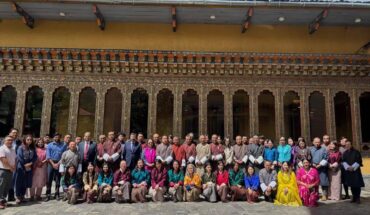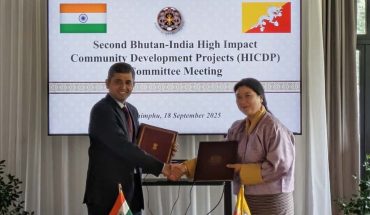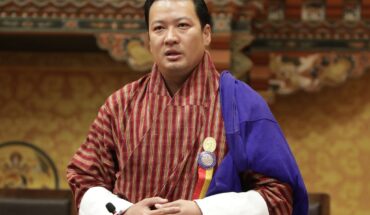
TASHI LHAMO
Thimphu
On December 21 the Royal Society for Senior Citizens (RSSC) organized a sensitization program to discuss Bhutan’s National Policy for senior ccitizens. The gathering met with the empathies for the collective approach in addressing the challenges faced by Bhutan’s ageing population.
Initially, the National Policy for Senior Citizens (NPSC) officially launched on October 13, 2023 aims to enhance the well-being of the country’s elderly citizens. It provides a comprehensive framework to ensure they lead dignified and fulfilling lives.
PM Tshering Tobgay highlighted the pressing need for the policy, given Bhutan’s demographic transformation. “Our nation is experiencing a significant demographic shift,” the Prime Minister stated, emphasizing that the elderly population is growing at an unprecedented rate. He attributed this trend to declining fertility rates and increased life expectancy, which are reshaping the country’s population dynamics.
The proportion of Bhutan’s population aged 60 and above constituted 9.5% in 2022. By 2047, this figure is projected to nearly double, reaching 19.7%. Similarly, those aged 65 and above accounted for 6.6% of the population in 2022, a figure expected to rise to 13.4% by 2047.
These changes also impact the ageing index, which measures the number of elderly people relative to children under 15 years of age. The index, currently at 28, is projected to rise to 78.5 by 2047, signaling a profound societal shift.
During the 11th “Meet the Press” session held on December 27, the PM reflected on the history and collaborative nature of the policy’s development. He acknowledged the foundational work initiated in 2018 during the tenure of the second government.
“Efforts were made back then to bring together all stakeholders to address the welfare of elderly people,” he noted.
The current policy builds upon the contributions of successive governments, ensuring a continuity of vision and action. “The previous government also played a vital role in shaping the policy, which was deliberated extensively before its formal adoption,” PM stated.
Highlighting the importance of a unified approach, the PM stressed that caring for senior citizens is a shared responsibility. “Serving the elderly is not solely the government’s responsibility but requires a collective effort,” he said. This sentiment underscores the significance of partnerships between the government, civil society, private sector, and international organizations in implementing the policy effectively.
PM assured the nation that steps are already being taken to translate the policy into action. “Work has already commenced in line with the policy,” he said, pointing to ongoing initiatives aimed at improving the quality of life for senior citizens. These efforts include enhancing healthcare services tailored to the needs of the elderly, creating age-friendly infrastructure, and promoting intergenerational solidarity.
One of the core objectives of the policy is to empower senior citizens by ensuring their active participation in society. This involves creating opportunities for lifelong learning, volunteerism, and economic engagement, enabling them to continue contributing meaningfully to their communities. RSSC, which hosted the sensitization program, has been instrumental in advocating for the needs and rights of Bhutan’s elderly population.
The event provided a platform for stakeholders to discuss the policy’s implementation and explore innovative solutions to address the challenges posed by an ageing society.
The NPSC represents a significant milestone in Bhutan’s efforts to adapt to its changing demographic landscape. By prioritizing the well-being of senior citizens, the government reaffirms its commitment to building an inclusive society where every individual is valued and supported.
As Bhutan prepares for a future where the elderly population will constitute a larger share of the population, the government, civil society, and citizens alike must work together to ensure that senior citizens are cared for, respected, and empowered. “Our senior citizens have contributed immensely to the growth and prosperity of our nation,” the PM added.
“It is our responsibility to ensure they live their golden years with dignity and joy.” With the NPSC serving as a guiding framework, Bhutan is well-positioned to address the needs of its ageing population and create a society that truly values and honors its elders.
As per the NPSC, the Office of Cabinet Affairs and Strategic Coordination (OCASC) shall be empowered to provide all policy guidelines and coordinate the implementation of the provisions of the policy across the government agencies and stakeholders.
The RSSC shall, in collaboration with the OCASC, implement the policy and its programme and services. The Ministry of Home Affairs shall develop an enabling condition to strengthen traditions, culture, and family values and preserve and promote inter-generational bonding.
The Ministry of Education and Skill Development shall create a platform for intergenerational bonding in educational institutes and also provide literacy and livelihood skills to senior citizens through non-formal education programmes.
The Ministry of Health shall provide comprehensive health services and facilities for the senior citizens on a priority approach such as establishing a one-stop centre to facilitate inclusive health services.
The Ministry of Infrastructure and Transport shall in collaboration with relevant housing agencies establish systems and mechanisms to provide adequate senior citizen-friendly homes and ensure senior citizens ‘friendly built-environment.
GovTech shall liaise with the media to take care of the sensitivity of the senior citizens in the news report and to ensure that online mediums are accessible by senior-citizens. The Ministry of Finance shall explore and provide adequate financial resources for the implementation of the policy, programs, and services.
The Centre for Bhutan Studies and GNH Studies in collaboration with the National Statistical Bureau shall conduct research and collect reliable data related to senior citizens. Studies shall be carried out on wide-ranging issues facing senior citizens.
This is critical to formulating evidence-based immediate policies, programmes, and interventions for senior citizens. In addition, they will support the Government in conducting evaluations where necessary for the review of effectiveness of the policy and relevant programmes.
The Universities, colleges and other research institutions in the country shall initiate and carry out research and studies targeted to senior citizens in order to support the Government for evidence-based decision making.
Finally, the Royal Bhutan Police shall provide support to protect senior citizens against abuse and violence through timely response and proper investigation of all matters concerning crime against senior citizens reported to the Police.
The religious organizations and institutes are mainly responsible for the promotion and preservation of religious and spiritual values in the country. It will play a crucial role in rendering support in mental and psychological well-being of senior citizens and imbibing spiritual values and practices.





